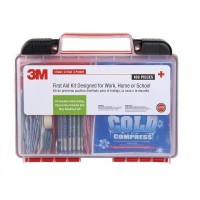Home Improvement Safety Tips


Stay Safe While Doing Home Improvement Projects
Each year thousands of homeowners are injured doing home improvement projects around their homes. Home improvement projects can be dangerous so it’s important to be prepared and outfitted properly in order to protect yourself. Below are some simple tips that will help keep you safe during your next project.
First Aid Kit


The Red Cross recommends the following items in a family first aid kit:
- 2 absorbent compress dressings (5 x 9 inches)
- 25 adhesive bandages (assorted sizes)
- 1 adhesive cloth tape (10 yards x 1 inch)
- 5 antibiotic ointment packets (approximately 1 gram)
- 5 antiseptic wipe packets
- 2 packets of aspirin (81 mg each)
- 1 blanket (space blanket)
- 1 breathing barrier (with one-way valve)
- 1 instant cold compress
- 2 pair of nonlatex gloves (size: large)
- 2 hydrocortisone ointment packets (approximately 1 gram each)
- Scissors
- 1 roller bandage (3 inches wide)
- 1 roller bandage (4 inches wide)
- 5 sterile gauze pads (3 x 3 inches)
- 5 sterile gauze pads (4 x 4 inches)
- Oral thermometer (non-mercury/nonglass)
- 2 triangular bandages
- Tweezers
- First aid instruction booklet
Save Your Eyes
Eye injuries are one of the most frequently occurring injuries and also one of the most preventable.
Lately I’ve been using 3M safety glasses in the shop and really like them. I really like this pair of traditional glasses because they are comfortable and durable.
Don’t Forget Your Ears
Most home improvement projects won’t immediately
For Father’s Day this year my kids got me a pair of 3M head phones with a built-in radio. These are great for mowing the lawn and listening to the ball game!
Don’t Work In The Dark
I really like using small LED task lights that I can position near my work. LED’s last much longer on standard batteries and they are far brighter than old style work lights. Energizer has been making some great work and tasks lights including the Energizer Fusion LED Folding Lantern.
Be Prepared for Fire
I recommend you purchase an A-B-C extinguisher which is a multi-purpose extinguisher that you can use on ordinary flammable materials, flammable liquids, and even electrical fires. Be sure to check it yearly to be sure it’s fully charged and ready when you need it.
Recent Posts
Framing Stick Nailer vs Coil Nailer
Which is Better a Stick Nailer or Coil Nailer? Framers have many choices in nailers…
How Many Roofing Nails Per Square of Shingles
Estimating How Many Nails for a New Roof When it comes to estimating materials for…
Composite / PVC Decking – Layout Tips & Advice
Composite / PVC Decking Layout Tips and Advice Composite and PVC decking have really changed…
Benefits of an ERV System (Energy Recovery Ventilator)
Benefits of ERV Systems (Energy Recovery Ventilator) If you're building a new home or doing…
Vermiculite Attic Insulation Abatement
Vermiculite Attic Insulation If your home was built before 1990 there is a chance it…
Nuisance Tripping of AFCI (Arc Fault) Circuit Breakers
Arc Fault (AFCI) Circuit Breakers Tripping Often An arc-fault circuit interrupter (AFCI) or arc-fault detection…